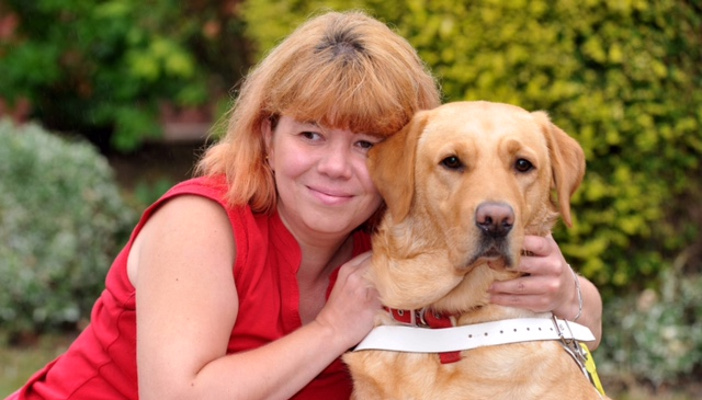Campaign win: Government will take steps on accessible info after legal challenge
We’re delighted the Department for Health and Social Care have agreed to make sure preferred formats are consistently recorded and acted on, after blind woman Sarah Leadbetter brought a legal case following failures connected to the shielding programme.

This is an enormous win for blind and partially sighted people.
Sarah’s experience
Sarah Leadbetter has a genetic condition that affects her immune system as well as being in remission from cancer. This means she is categorised as clinically extremely vulnerable and therefore should have been shielding. Frustratingly, she only found this out recently after already experiencing multiple lockdowns.
She only discovered she should have been shielding because her disabled mother is also shielding and therefore received the same letter.
Sarah had been sent at least four letters in 2020 from the Department of Health and Social Care (DHSC) regarding shielding, which were completely inaccessible to her due to her vision impairment - she needed information via email or in a Word or PDF document that is compatible with a voice-reader.
RNIB has been consistently raising this issue as part of our Info For All campaign, and had brought it up with the Prime Minister as far back as April 2020. Although we have been supporting the DHSC to provide accessible formats of the shielding letter, we have consistently been saying that these accessible formats should be being routinely and automatically sent to those who need them, using communications preferences recorded by GPs. Currently they are only available to people who seek them out.
Sarah’s legal case
Sarah’s case had been scheduled to go to a judicial review hearing on March 17 and 18, and had supporting evidence from RNIB and the Equality and Human Rights Commission (EHRC).
This evidence supported Sarah’s claim that Health Secretary Matt Hancock’s failure to provide accessible shielding correspondence for blind and partially sighted people put his department in breach of its duties under the Equality Act 2010, did not comply with the Accessible Information Standard and discriminated against Sarah under Articles 8 and 14 ECHR.
However, instead of going all the way to court, DHSC has now agreed:
- To reconsider its practice of sending out hardcopy letters to people on the Shielded Patients List that are not individually tailored to their communication preferences
- To consider how information on shielding can be given in an accessible format to disabled people and/or people with communication needs who are on the Shielded Patients List
- To commission work to investigate technical issues in identifying the communication needs of people on the Shielded Patients List, and to work out how to address shortcomings in the information held in the Personal Demographics Service (which records communication needs)
- The work will be completed and any new system will start to be implemented within four months of the date of the court’s Order
- The Secretary of State for Health and Social Care will continue to work with GPs and hospitals to improve the recording of communication needs in patients’ records
In response to this brilliant news Sarah said:
"I am very happy that the DHSC has agreed to change its practices following my legal action. The Equalities and Human Rights Commission had got behind my case in Court this week. I was hopeful that their intervention would help the Judge understand why the government was acting unlawfully by providing me with shielding letters that I cannot read. "
Samantha Fothergill, RNIB’s Senior Legal Adviser, said: "We are delighted that this matter has settled with the Government agreeing to reconsider its practice of sending inaccessible communications to blind and partially sighted people on the Shielding list; an issue we have been raising with them since the start of the pandemic.”
What this means for future communications
Following our #InfoForAll campaign on accessible shielding information, RNIB are thrilled to hear of this development which will be incredibly helpful to blind and partially sighted people.
Samantha continued:
"Blind and partially sighted people consistently tell us how important it is to receive communications, especially health communications, in the right format.
We hope the Secretary of State will now take steps to ensure that, in addition to shielding information, vaccine and other non-pandemic related health communications are also accessible from the start. "
This result also reconfirms that the Accessible Information Standard applies to the DHSC, commissioning boards and anyone else providing health or social care services and we hope it will pave the way for all medical and social care correspondence now being sent in accessible formats as the standard requires. One of our particular concerns is the accessibility of communications relating to various screening programmes like bowel cancer screening.
We will continue to hold the Government to account on accessibility, for example on vaccine communications. Unfortunately the pandemic has really brought home how far we still have to go on this issue.
We have an accessible information toolkit which you can use to challenge inaccessible information about health and social care. If you continue to experience issues getting information about your health or care in accessible formats please let us know by contacting [email protected].







